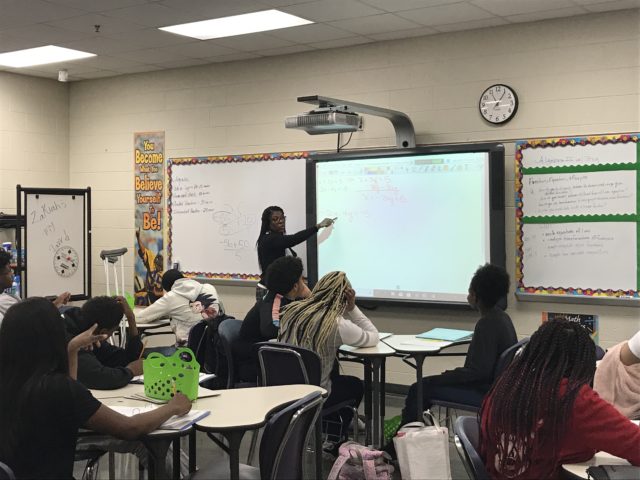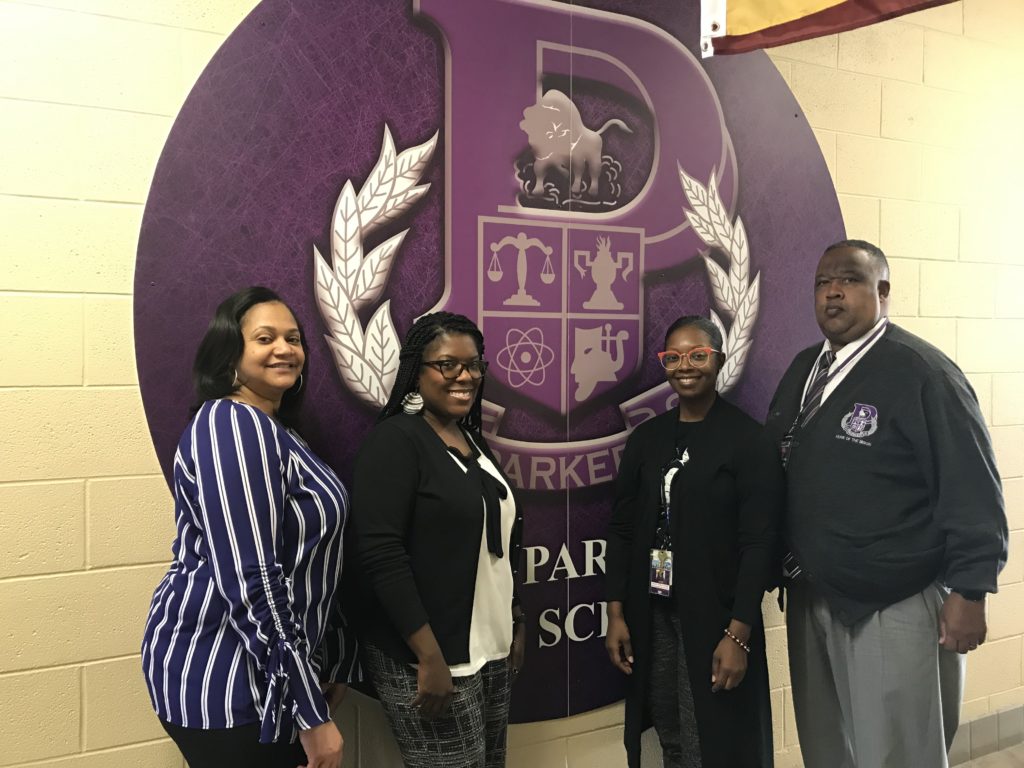
By Erica Wright
The Birmingham Times
For the first time in three years, A.H. Parker High School is off of the state’s failing-schools list. When the Alabama State Department of Education released its list of failing schools on November 1, Parker was nowhere to be found. Not only that, but the school’s grade on the annual state school report card of academics increased by six points, from a 63 to a 69.
Parker Principal Darrell Hudson attributes the progress to several factors.
“I’ve shared with the faculty and staff that I knew that we could do better,” he said. “I’ve told them several times I was tired of being on the failing list, and we have a better faculty and scholars here. … They took what I said, implemented it in the classroom, and really made it happen.”
Out of seven Birmingham City Schools (BCS) high schools, Parker now joins Ramsay as one of two choice high schools in the city. Because Parker is off the failing list, it is now a choice school.
What does that mean? If a student goes to a school on the failing list, they have the choice of staying at that school, being home-schooled, or choosing to go to one of the schools that is not on the failing list—a school like Parker or Ramsay.
A total of 16 BCS schools are on the 75-school statewide failing list. At Parker, the principal credited the school’s success to improved test scores and hard work through efforts by faculty like English language arts teacher and department chair Kian Threadgill; mathematics teacher Dawonna Pitts, and curriculum coach Melody Brown, all of whom serve on the school’s leadership team.

Parker’s leadership team emphasized some of the programs teachers should be using, such as Mastery Prep, a resource that teachers have adopted to enhance student skills and knowledge about content for the ACT. As a curriculum coach, Brown meets with teachers to help them to apply the course in their classrooms.
“All core teachers—English, math, science, and history—did 30 minutes of Mastery Prep with their classes,” she said. “Then I would go in to observe and make sure the teachers were implementing that program.”
Threadgill said, “Mastery Prep is designed to enhance the core areas, such as English, math, science, and history. But the ACT does not have a true history or science component, so those two areas mainly focus on reading, and that is how we use it across the curriculum.”
In the English department, teachers worked together to focus on a particular grade level to make sure students were learning the necessary skills.
“Because we as a department were able to have one teacher for each grade level, we [focused] on the sophomores to make sure they had the skills they needed. [In their junior year], it would be more of a refresher, as opposed to having to completely teach those skills and strategies, as well as the components as they relate to Mastery Prep objectives,” said Threadgill.
In the math department, Pitts said students had a significant growth—about 90 percent—in test scores from the previous year.
“The Same Accord”
Parker’s 11th-grade teachers sat down together and worked out a plan about which objectives they would cover.
“We wanted everyone to be on the same accord with what the kids were going to be learning to coincide with what we were teaching in our classrooms, so we were still covering the state objectives,” said Pitts. “As a result, we saw growth with the kids.”
In addition to Mastery Prep, the school also conducted an ACT boot camp during school hours and sometimes on Saturdays, in addition to providing after-school tutors.
The Parker community focused not only on curriculum but also on culture—at all levels. The students wanted to get off the failing list as much as the administration, especially the senior class of 2020.
“We met with the juniors and seniors, shared data with them, and told them, ‘The class of 2020 got us off the list, but it’s up to the class of 2021 to keep us off the list,’” Hudson said. “Of course, the [freshman and sophomore] teachers and students play a role, as well, because it’s a schoolwide assessment. … The teachers, the clerical staff, the maintenance staff, the child-nutrition staff, everybody plays a key role in student achievement here at A.H. Parker High School.”
Pitts agreed and said student buy-in was a major factor.
“We had to let them know that the test is really important, not just getting us off the failing-school list,” she said. “If they plan on doing something after high school, like going to college, their ACT scores play a major role. … Once we got the kids to buy in, they took it more seriously than just going in and taking a test. We had more kids who wanted to do better.”
Other schools can learn from Parker’s success, Threadgill said.
“The hard work, dedication, collaboration, and overall effort from everybody involved is what I think other schools can take away from us,” she said. “There was buy-in from both the teachers and the students. … Teachers gave up a lot of their time, but students did, as well. They did a really great job and changed their mindset.”
To read more stories about BCS progress, click one of the links below.
Barrett Elementary Was Once Considered A ‘Failing’ School. Not Anymore.
Principal Tikki Hines Brought Hope and Aura of Success to Barrett Elementary




